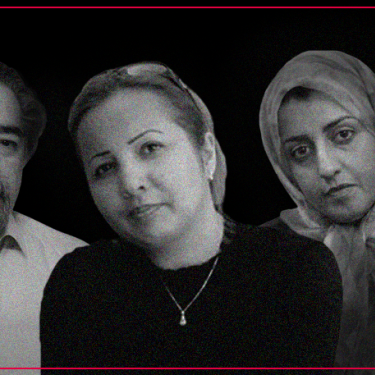RSF requests urgent OHCHR action on tragic plight of journalists imprisoned in Iran

Reporters Without Borders (RSF) wrote to UN High Commissioner for Human Rights Michelle Bachelet on 13 June – the first day of the UN Human Rights Council’s 50th session, which continued until 8 July – drawing her attention to the appalling conditions in which many journalists are detained in Iran. These journalists are being denied medical care despite being ill and despite being badly affected physically and psychologically. RSF urges Michelle Bachelet and Javaid Rehman, the UN special rapporteur on the human rights situation in Iran, to take action to end this criminal behaviour, which is tantamount to state murder.
Ms. Michelle Bachelet
High Commissioner for Human Rights (OHCHR)
Office of the United Nations
Palais des Nations,
CH-1211 Geneva 10, Switzerland
Paris, 13 June 2022
Re: Urgent necessity to address the dire situation of imprisoned journalists in Iran
Dear High Commissioner,
On the occasion of the 50th session of the Human Rights Council, which opens today, Reporters Without Borders (RSF), an international independent organization that promotes and defends the right to free, independent and pluralistic journalism, would like to draw your attention to the appalling conditions of detention to which all too many journalists are subjected in Iran.
Currently in this country, ranked 178th out of 180 in RSF's 2022 World Press Freedom Index, 24 journalists are languishing in prison for having carried out their work. Several of them are ill and deprived of medical care, and others are subject to direct and indirect death threats from the prison administration.
Among the imprisoned journalists, we are gravely concerned about the health of Narges Mohammadi and Alieh Motalebzadeh, who were both arrested at their homes on April 12 and taken to the infamous Evin prison and then to Gharchak women's prison, while on medical parole. Since then, their detention has been a long ordeal: while she had undergone a heart surgery shortly before, Mrs. Mohammadi was deprived by the prison administration of her medical treatment for a week. And on April 23, Ms. Motalebzadeh and Ms. Mohammadi were informed that they were "banned from medical leave for six and three months respectively" and that the country's prisons organization had filed a complaint against them.
It is clear that this deterioration in their conditions of detention comes in retaliation for the attempts of these detainees to have their most fundamental rights respected, as Ms. Motalebzadeh had tried to do by writing an open letter to the head of the judiciary, Mr. Gholam Hossein Mohseni-Ejei, to contest the unlawful nature of her arrest and to denounce the harassment by members of the intelligence services against her in Evin prison. Her continued detention, when she should have been released legally after serving one third of her sentence, also speaks volumes.
We are concerned about this new technique of repression that aims to psychologically and physically break imprisoned opponents and critics by denying their basic right to access health care and by persistently imprisoning them - on spurious grounds - for merely exercising their right to freedom of expression.
Despite their recent release and advanced age, journalists Kayvan Samimi Behbahani (73) and Alireza Saghafi (69), prominent figures in Iranian journalism, were recently sent back to prison to serve 3 years and 1 year respectively behind bars. The former was released in February after forensic doctors confirmed his "inability to withstand the conditions of detention", while the latter was already suffering from high blood pressure at the time of his arrest and from severe fatigue caused by a disastrous diet in detention.
The Coronavirus pandemic, despite its lethality in Iran, has not slowed down the use of this repressive technique either: Reza Khandan Mahabadi (60), a journalist and member of the Iranian Writers' Association who was hospitalized at the beginning of January after seeing his health deteriorate severely as a result of his infection with the Coronavirus, was forced to return to his cell on 5 April, although still suffering from breathing problems. The authorities drew no lesson from the tragic death of his fellow inmate Baktash Abtin, also a member of the Iranian Writers' Association, who was not treated in time and died on January 8, 2022, of a Coronavirus infection in Evin prison.
Unfortunately, independent voices who try to raise the Iranian public opinion on these shameless deprivations of care are also suppressed, like photojournalist Soheil Arabi, already heavily imprisoned in the past, who was sentenced to two years in prison last April.
This dire situation therefore calls for strong and immediate action by your office. We respectfully urge you to call on the Iranian authorities to respect their international commitments, most especially the International Covenant on Civil and Political Rights (ICCPR), to which Iran is a party and to press them for the unconditional release of journalists in Iran.
While under the ICCPR, the deprivation of medical care constitutes a violation of the prohibition of torture and cruel, inhumane or degrading treatment, Iranian law (arts. 102 and 104-3 of the Rules and Regulations of Prisons in Iran) requires prison authorities to provide sick prisoners with adequate care.
On January 15, 2022, RSF called on the UN Special Rapporteurs on the situation of human rights in Iran, on extrajudicial executions and on torture and other cruel, inhumane or degrading treatment or punishment, to shed full light on the circumstances of Baktash Abtin's death. Now, it is a question of putting an end to these systematic criminal behaviors of the authorities and we urge you to take action.
Yours sincerely,
Antoine Bernard
Director, Advocacy & Assistance
